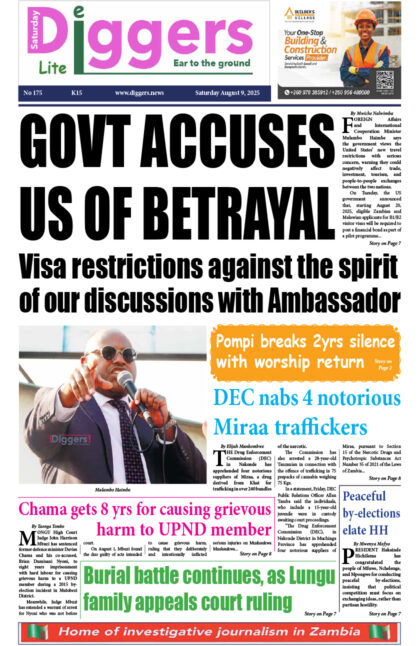The Constitutional Court will on Thursday, this week, rule on the request by the Law Association of Zambia (LAZ) to restrain the National Assembly from continuing with the legislative process to enact the Constitutional (Amendment) Bill No.10 into law, pending determination of its petition.
And the court will on October 22 rule on the State’s motion to have President Edgar Lungu and the National Assembly misjoined from the LAZ petition.
Meanwhile, the application by the State to set aside the subpoenas on the Attorney General Likando Kalaluka and Minister of Justice Given Lubinda, will be heard on October 16, 2016.
LAZ had subpoenaed Kalaluka and Lubinda to appear before the Constitutional Court on Friday to testify in its petition.
But Kalaluka has asked the court to set aside the Subpoenas for irregularity as no leave of the court was sought.
Kalaluka also argued that LAZ did not specify what documents the proposed witnesses should produce before court.
In this matter, LAZ has dragged President Edgar Lungu, the Attorney General and the National Assembly to the Constitutional Court for attempting to alter the Constitution of Zambia through Bill 10, 2019.
When the matter came up before the full bench of five Constitutional Court judges headed by the court president Hildah Chibomba, Friday, LAZ lawyer John Sangwa in his renewed application for an injunction, argued LAZ’s dissatisfaction with the ruling of a single judge Annie Sitali, who dismissed its first application for an injunction against the National Assembly.
He said in the absence of an injunction, the respondents would implement their decisions and the Constitution would be altered, adding that there would be nothing to defend.
Sangwa said justice Sitali misdirected herself in law and fact when she held that LAZ would not suffer any irreparable injury if the injunction was not granted because it would return its right to defend the constitution at the hearing of its petition.
He wondered how LAZ would return its right to defend the Constitution in the main matter without an injunction.
Sangwa said LAZ would not benefit from the petition financially but was simply acting in the interest of the public, adding that in Constitutional matters, injunctions were available against the State and State institutions.
“The jurisdiction that is vested in this court, should be exercised in a manner that brings about accountability. If the court takes the view that injunctions are not available against State organs, then the court will fail to hold State organs accountable,” Sangwa said.
“We are challenging the decision of the single judge that there will be no irreparable injury that will suffered.”
But in reply, Attorney General Kalaluka argued that the single judge, in deciding that LAZ had not shown irreparable injury, was based on the fact that the legal body shunned Parliament’s invitation to submit before the select committee to defend the constitution.
“They had a chance to defend the Constitution before Parliament but they opted not to do so. The reason the court found that it would not suffer irreparable injury is because they spurned an opportunity that was given to them. Had they gone to Parliament and appeared before the select committee they would have demonstrated how the Bill does not meet the aspirations of the people of Zambia,” Kalaluka said.
Sangwa, however, submitted that by the time the invitation was received by LAZ, its petition was already before court, adding that when a matter was before court, it should be left to the court alone and should not be a subject of adjudication anywhere.
“We cannot go to the Assembly and submit the same arguments we have submitted before court, appearing before the committee doesn’t defend the Constitution as the submissions are not binding. I defend the Constitution by moving the court and not appearing before a committee,” he said.
He insisted that this was a proper case for which the court could grant an injunction.
The court reserved ruling for October 17.
Meanwhile, Kalaluka had earlier argued before a panel of seven judges why the President and the National Assembly should be misjoined from the proceedings, saying the court had on several occasions pronounced itself that when State institutions were being challenged, the Attorney General was the right person to sue.
He said if the President and the National Assembly were misjoined, LAZ would not suffer any prejudice.
“Our prayer therefore is that this court grants the order of misjoinder and removes the President and National Assembly from the petition. We pray that this court condemns the petitioner with costs,” Kalaluka said.
But Sangwa argued that the President was not the government and neither was the National Assembly.
He insisted that the three respondents violated the Constitution, and it was incumbent upon each one of them to appear before court and answer for their actions.
“What’s in issue is not the President, National Assembly or the Attorney General, but what they did. We have not sued anyone. There are no defendants in this case but only respondents. They must respond why they violated the constitution,” Sangwa said.
Ruling was reserved for October 22.

























One Response
Sangwa you are not acting for the public but for LAZ when did the “public” and which public requested LAZ to halt bill 10? Mwiitwa us serving his own interest